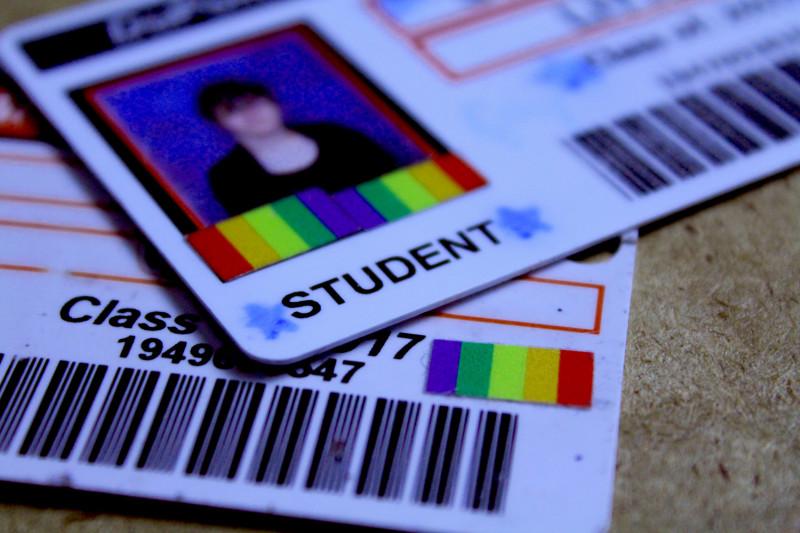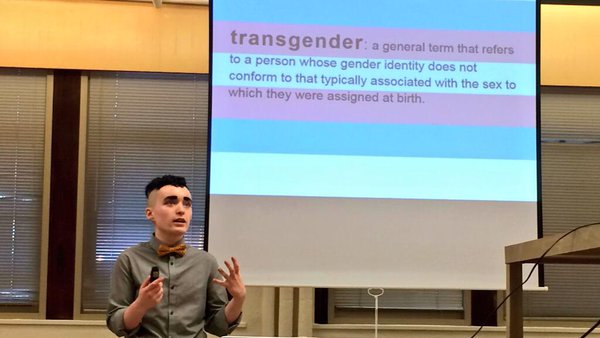
An initiative to provide additional support for LGBTQ students at Manual has been halted by the school’s administration on the grounds that it could cause discrimination against any faculty that chose not to participate and might stunt discourse between students and teachers.
“This year what we really wanted to do was have students and teachers both have something on their ID to basically subtly let somebody know that if they needed to talk to somebody or if they were in a situation where they didn’t feel comfortable, that basically they were absolutely open to hear whatever,” said GSTA President Oberon Coverdale (12, VA).
The idea would have been implemented via displaying a rainbow sticker on the IDs of participating students, teachers, and administrators.
Clare Gervasi, an activist who has run workshops for JCPS employees on transgender issues, endorsed the idea.
[quote_box_right]“It’s hard to know if you’re being singled out for being trans, because you want to give everybody the benefit of the doubt, but there have definitely been teachers that point to you as a novelty.” — Oberon Coverdale[/quote_box_right]
“I think it is a great way to initially signal to students that a teacher or staff member has done extra, conscious work on themselves, including educating themselves, in order to be able to support students grappling with questions of gender and sexuality,” said Gervasi, who works with the organization TSTAR. “Through signaling this commitment, students may be encountering the first adult in their lives who has been open to their questions or concerns about their own identities.”
However, when the sticker idea was proposed by the GSTA and adviser Ms. Martha Brennan (English), it was rejected by Principal Jerry Mayes for a number of reasons.
“All teachers should be open and available for their students, period, regardless of whatever issue,” Mayes said. He said that Manual shouldn’t have any teachers that don’t support their students: “If I find one that’s not, I have an issue with it.”
Mayes went on to say that the initiative could cause students and staff to make unwarranted conclusions about those who do not have a sticker.
“Let’s say someone had a sticker on: Someone’s making the assumption that they’re okay and this person over here is not okay. I will never support anything like that,” Mayes said. “The day we start separating teachers out, we have a big problem. I have a very open door policy, and that goes against my philosophy.”
According to Mayes, this issue goes beyond the scope of LGBTQ discussion. He thinks the initiative sets a dangerous precedent for the discussion of other issues, such as economic problems, magnet stereotypes and racial issues. It is his belief that all teachers should be open and willing to discuss all of these issues with any student who is grappling with them.
“Every teacher needs to be open to every student we have,” Mayes said.
Student Will Lake (11, J&C) said he supports Mayes canceling the initiative.
“I know if I were a student dealing with an LGBTQ issue and I went into a class and saw that a teacher didn’t have a sticker after being expressly offered a sticker, I might feel kind of uncomfortable in that room, like ‘Oh, is this person not accepting of who I am?’” Lake said. “I also see Mr. Mayes’ point that it also singles out teachers. They have a right to their own opinion,” Lake said.
Lake agreed that the initiative could create a schism between teachers and students, causing some students to see teachers without stickers and label them as unwelcoming or bigoted. Lake also said that due to the progressive nature of Manual as a school, the initiative may even cause issues within the student body.
“I think there would be a lot of peer pressure,” Lake said. “I’m not even necessarily saying that I wouldn’t have a sticker on, but if I were in a situation like that, I can see how it would be uncomfortable to not have that if everyone else does.”
Mayes also said that while this specific initiative will not happen, he still attempts to support the GSTA in a variety of ways, including occasionally sitting in on GSTA meetings and allowing the club’s president, Oberon Coverdale (12, VA), to speak at faculty meetings in an effort to educate teachers and administrators on LGBTQ issues, which he believes has helped to create a helpful, open dialogue with LGBTQ students.
“I think there’s an overall acceptance,” Mayes said. “I think we don’t hide from the topic. We try to support some initiatives while trying to stay fair to everyone else who has a difference of opinion on that, and I think that’s the big issue.”
“I think most are receptive to that kind of thing,” Lake said. “I definitely think if students have questions or are dealing with issues or something like that, in regards to those issues, I do think they have outlets for that at Manual with their teachers.”

However, Coverdale argued that there is still room for improvement.
“While I appreciate the idea of an open door policy with all the teachers and Mr. Mayes, it’s not that simple,” Coverdale said. “If we’re going to take a look at the actual issues at Manual, we have to be honest with each other and say, ‘Our quality of life is good, but we have so much room to grow.’ But if we continue to conceptualize ourselves as ‘Manual is the best school ever on all accounts,’ that’s just not being realistic.'”
“I don’t believe it’s discriminatory in the slightest,” Gervasi said. “It is an unobtrusive, inexpensive, immediate, initial way to show students that someone at the school sees them and values them as they are.”
According to GSTA member Jamie D’Amato, while Manual is a fairly accepting school that often avoids many of the issues that other schools sometimes have in terms of anti-gay discrimination, the initiative still has a multitude of benefits to offer the LGBTQ community at Manual.
“It’s really good to have people who are not just not homophobic, but people who are outwardly like, ‘I’m good to talk to about these issues,’” D’Amato said. “It just makes them more approachable, and if you have issues at home that you don’t know who to talk to about, this is a signifier like, ‘Hey, I’m safe to talk to.’”
Gervasi also pointed to JCPS’s vision statement — “All JCPS students graduate prepared to reach their full potential and contribute to our society throughout life” — and said that it is integral for JCPS to support their minority and LGBTQ students if they have any hope of achieving this goal. To do this, Gervasi said they must fulfill their legal obligation (under Title IX and the JCPS Gender Identity Amendment) to provide schools that are “staffed, resourced, and equipped to support student needs.” Given the disproportionate suicide rates among LGBTQ youth, Gervasi believes it is the district’s moral obligation to provide such resources.
While Coverdale and Little acknowledged that many teachers at school are adept at dealing with LGBTQ issues, they believe that there is still room for improvement in regards to teachers understanding how to handle LGBTQ students and the issues they may have.
“It’s hard to know if you’re being singled out for being trans, because you want to give everybody the benefit of the doubt, but there have definitely been teachers that point to you as a novelty,” Coverdale said.
“For LGBTQ students, knowing that there’s a teacher you can talk to and knowing that there’s a safe space for you is really important and vital,” said GSTA vice president Rowan Little (11, J&C). “It is kind of like a battle. You have to know who your allies are.”
Little said that the sticker initiative would have hopefully worked as a catalyst for a larger discussion about gender and LGBTQ issues at Manual, leading to an increased awareness and understanding of what it takes to be an ally and help educate others about LGBTQ issues.
Coverdale also said that it was important for LGBTQ students to have a supportive teacher they could rely on and talk to.
“To be able to talk to teachers like Ms. Brennan and even Ms. Ritchie and all of these people here was so awesome,” Coverdale said. “I wanted to stay at school and be able to feel like normal and to feel like I could talk to somebody about stuff and not have it be walking on eggshells.”
Mayes agreed that some teachers are better equipped to discuss LGBTQ issues than others, namely those with more exposure to LGBTQ issues.
“I believe those of us that understand and deal with it everyday have more exposure to it. It’s like anything,” Mayes said. “So yeah, I think there are those who are more educated. That’s why I made it a point to have [Coverdale] come to the faculty meeting. Part of my mission was to educate the faculty members. So we’ve tried to do that.”
Gervasi has seen these steps to educate teachers and faculty taken throughout JCPS, including the passage of the Gender Identity Amendment, optional education courses through the Equity and Inclusion Unit and a specialized course for faculty who directly interact with LGBTQ students. Gervasi suggested that Mayes require a professional development day spent training teachers and faculty on issues regarding LGBTQ students, which would make them not merely approachable with such issues, but competent to deal with them.
“What it really needs to be is less lecturing and us speaking at them and more us having real conversations with them,” Coverdale said. “That’s how the best of us can give our help to teachers, is to be like, ‘Hey, tell us what you want to know. Don’t worry about being offensive. Tell us about your experiences. Let’s talk to you.’”
Aside from an increase in education and awareness, Gervasi said there are a variety of other ways schools can support their marginalized students, such as written and verbal acknowledgement of student’s identities, verbalizing a commitment to diversity, equity, and inclusion as outlined in Title IX, incorporating LGBTQ history, science and culture into the regular curriculum and attempting to hire more diverse faculty.
Even without the sticker initiative in place, Coverdale is looking at a variety of ways to increase LGBTQ awareness within the school, including the implementation of gender-neutral bathrooms and possibly organizing a celebration of LGBTQ culture similar to Black History Month.
“GSTA’s goal is to educate and to also give people room to empathize,” Coverdale said. “We want people to know that GSTA is just as representative of Manual as Manual is of them,” Coverdale said.




